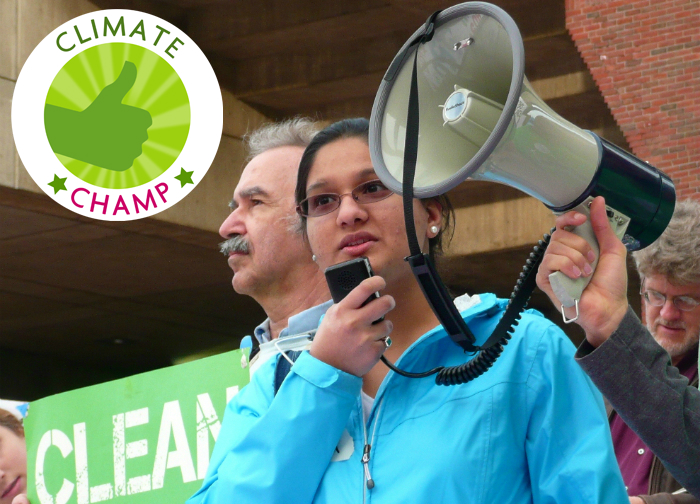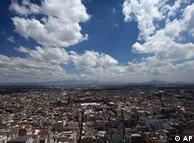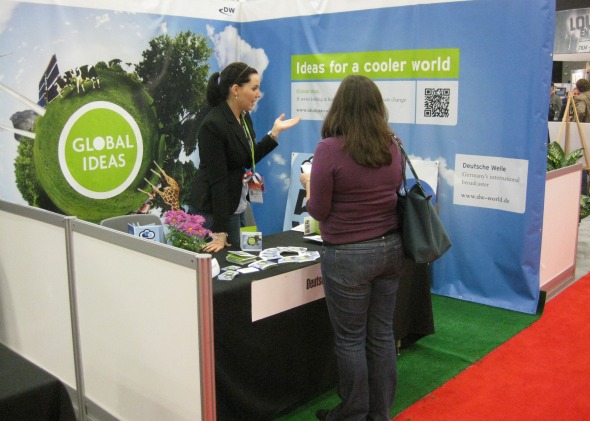Search Results for Tag: USA
Climate Champ – This isn’t a game. Our future is at stake.

Do you feel responsible for our future? Are you tired of waiting for a breakthrough at climate conferences? If you are already taking action yourself, you are our ClimateChamp and we want to get to know you! Answer our questionnaire to become a part of our new blog series, take your chance to be nominated as a Climate Champ.
1.What is your name, how old are you and where do you live?
My name is Srijesa Khasnabish and I’m eighteen years old. I’ve lived in Lexington, Massachusetts (USA) for most of my life.
2.How does the climate change affect your everyday life / your community?
I am shocked by how climate change impacts so many different aspects of my everyday life. For example, how I get to school in the morning: if I wake up early, I take the bus and save some carbon dioxide emissions. If I wake up late, miss the bus, and have to drive to school, I’m further contributing to global warming. I always shake my head in disgrace when I see my peers driving to the town center in the middle of the day whereas it only take seven minutes to walk there. This is one thing that motivates me to action.
What is most detrimental to my community is the severe storms we’ve been experiencing. During Hurricane Sandy, damages were extensive. An old pine tree even fell on my house and crashed into my living room! Many people’s basements were also flooded and most of our community was without power for up to 3 days.
3.What trigger event led you to start fighting climate change?
What sparked my interest in the climate change movement was an assembly I watched four years ago, presented by the Alliance for Climate Education (ACE) and created to educate youth about climate change and inspire solutions. The forty-five minutes I spent watching this assembly changed my perspective radically and converted me into a fervent climate activist. Today I am the New England Youth Representative for ACE, where I help to galvanize the Youth Climate Movement in my local community.
4.How exactly do you fight climate change?
I fight climate change on several levels. First of all, in my house: my family recycles, we’re conscious of the energy we use, we hang our clothes out to dry, and eat vegetarian several times a week. At school, I’m the president of the Global Warming Action Coalition. This year, we’re working to maintain a student run vegetable garden and establishing a school-wide composting system. We’ve purchased bike racks and are working on getting hand dryers in our school’s bathrooms to reduce waste. Outside of school, I’m the New England Youth Representative for ACE. As a Youth Rep, I help facilitate at monthly Youth Leadership Trainings, give speeches and raise awareness about youth climate action in Massachusetts, and blog about climate change and my experiences. Last year I was a keynote speaker at a Youth Climate Summit at MIT, and I participated in a Climate Vigil to encourage the Massachusetts Senate candidates to address climate change in their debates. I consider the work I do with ACE extremely important because I’m helping to educate and motivate youth to take action against climate change. I’m spreading a cause I earnestly care about and I find it exceptionally rewarding.
5.What is your opinion about climate change skeptics?
I strongly believe all skeptics must wake up to the climate change crisis because it’s a universal issue – it doesn’t matter where you live, or how rich or poor you are, you’re impacted by climate change. And if I could realize that when I was just fifteen years old, children and adults worldwide should be able to acknowledge it too. More importantly, the amount of time we have to address climate change is limited. The sooner the world acknowledges this issue, the sooner we can cooperate to build a brighter future, one where policies are enacted to protect the planet and there’s a change in the human way of life. This means people are conscious of their emissions: they think about where their food comes from and how their houses are being heated, and how all of this affects the environment. People think twice before buying a plastic water bottle or throwing a half-eaten apple in the garbage, where it will be buried under pounds of trash and release methane as it decomposes.
6.Worst case scenario: What do you think your city looks like 10 years from now, if no action had been taken to fight climate change?
I envision more frequent, monstrous storms that damage homes, power lines, trees and people’s lives. The destruction caused by these storms will reduce the quality of life in Lexington and be detrimental to the economy as well (especially because Lexington makes a large income on tourism). The intense summer heat will cause many people to perish, and emissions from cars will cause smog in the air, leading to more children suffering from asthma.
7.Best case scenario: What do you think your city looks like 10 years from now, if more and more action had been taken to fight climate change?
Ten years from now I hope to see a variety of infrastructure improvements throughout Lexington. I imagine plastic bags and bottles will be rare and backyard vegetable gardens will flourish behind every house. I also envision smaller houses and cars, perhaps even zero cars per household because buses and subways will be the preferred mode of transportation. The bike paths throughout town will be reworked such that they are easily accessible by everyone and the optimal way for children to get to school when the weather permits. The town will save a tremendous amount of money on energy, as solar panels will be mandatory and the rest of the needed energy will be wind energy, produced in one section of town. Education about climate change will begin in elementary schools, where children will also develop the habit of recycling and composting – sustainability will be second nature to them by the time they are in high school.
Perhaps my vision of the future is a bit unrealistic or is more accurate as a description of what my city will look like in 20 years, but the core of what I want to see in the future is more education on the causes and impacts of climate change. I feel that if more people understand how human choices and actions are triggering problems like sea level rise and severe weather conditions, they will be more likely to ameliorate their lifestyle in an earth-conscious way.
8.Short and simple: What do you demand from your government as far as climate change is concerned?
I demand that the US government 1) reject the Keystone XL pipeline and 2) take climate change seriously by passing laws that are in line with the science and protect our planet and its inhabitants. This isn’t a game. Our future is at stake.
New record in world wind market
 The World Wind Energy Association (WWEA) has some good news for the world market for wind turbines. Not only that the market has recovered last year, it also set a new record: 42 gigawatt of new capacity had been installed in 2011, the worldwide total capacity rose up to 239 GW. According to the WWEA todays wind power would be enough to cover 3 % of the world’s electricity demand. China is the biggest player in the business, says the WWEA. The country installed around 18 GW of new wind turbines within 2011, coming to a total capacity of 63 GW – that’s more than one fourth of the global wind capacity. The second largest market for new wind turbines was again the USA, followed by India and Germany, which grew about 2 GW.
The World Wind Energy Association (WWEA) has some good news for the world market for wind turbines. Not only that the market has recovered last year, it also set a new record: 42 gigawatt of new capacity had been installed in 2011, the worldwide total capacity rose up to 239 GW. According to the WWEA todays wind power would be enough to cover 3 % of the world’s electricity demand. China is the biggest player in the business, says the WWEA. The country installed around 18 GW of new wind turbines within 2011, coming to a total capacity of 63 GW – that’s more than one fourth of the global wind capacity. The second largest market for new wind turbines was again the USA, followed by India and Germany, which grew about 2 GW.
Breakdown: tackling climate change

Restrictions on driving and industry have helped to reduce emissions in Mexico City.
A lot of experts and analysts in the field of climate change say 2012 is a key year in the battle against global warming. Coming off the heels of Durban, many believe this will be the year to prove that the world is ready to take the next step forward – especially with significant parts of the Kyoto Protocol set to expire by the end of the year.
But to move forward, it’s important to know exactly where we stand! National Public Radio (NPR) in the United States recently featured a great breakdown on what the world’s political powers – and some of the biggest polluters – are doing to fight climate change in their respective countries. According to the article, the many of the biggest greenhouse gas emitters have already set goals on a national level to slash harmful emissions. Because there has been little progress on the international level, they have decided to move forward at home.
Those national goals include things like putting a stop to deforestation, investing more in clean, renewable energy sources and working with cap-and-trade policies to curb emissions. If you live in one of the listed countries, take a look at what your government is doing to fight climate change…and if not, let us know!
GLOBAL IDEAS @ SXSW

This year GLOBAL IDEAS visited the South By Southwest (SXSW) festival in Austin, Texas. We had a booth there to explain the contents of our programme and to show who is behind all the 'ideas for a cooler world.' SXSW is a set of film, interactive and music festivals and conferences that take place every spring. The festival started in 1987. At the beginning there were 700 registrants. Today about 12,000 creators, labels, media producers and entrepreneurs are registered.

Hard cash for your tech trash
ecoATM, a startup company from San Diego, has recycled the idea of cash machines. If you are living in the southern California region you may have a good chance to find one of the so called kiosks, you can see in the video below. These machines will recycle your unused tech items and give you money for the trashy things. If you have an expired cell phone, an overplayed MP3 player or used-up ink cartridge, the ecoATM will determine the product, estimated it's value and will make you and offer (you might not be able to refuse). The idea could be a goldmine not only for the company, but for the recycling market as well. Because, according to the United Nations Environment Programme (UNEP), the recyling potential of electronic trash is especially significant. Every year the world generates about 40 million tons of E-waste, which contains valuable quantities of gold, silver and copper. More information on the values of trash you will find here.








Feedback